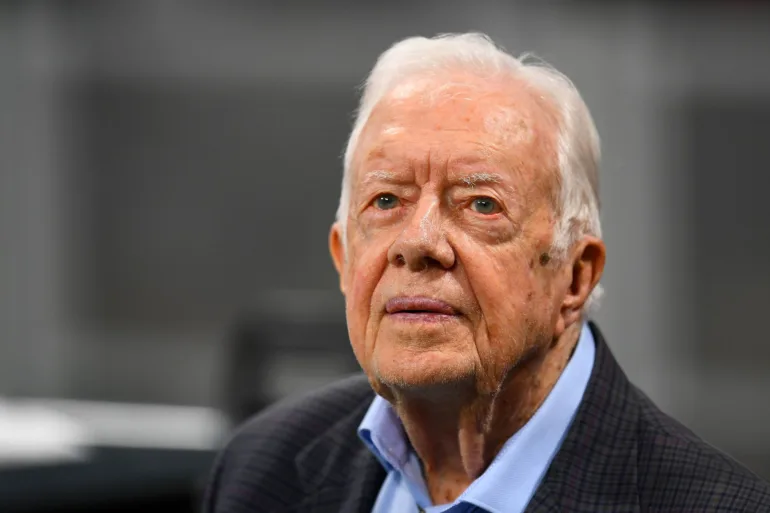For years, visitors would drive into the parking lot of Maranatha Baptist Church in rural Plains, Georgia, in the early hours, lining up in the pitch black to attend Jimmy Carter’s Sunday school class.
Some were Christians, some weren’t. Many were Americans, but a substantial number came from abroad — Brazil, Canada, Russia. Whether evangelical Christianity was their faith or not, it didn’t matter.
Carter’s death on Sunday at the age of 100 marks the passing of more than just a former US president. It marks the end of an era for a man whose presidency was defined by an unshakable Christian faith and whose political views seemed at odds with much of today’s America.
A Democrat, a Baptist, and a peanut farmer, Carter was elected in 1976 at a time when the nation was reeling from the fallout of the Vietnam War and the Watergate scandal, which led to Richard Nixon’s resignation. To many, the “born-again” Christian was seen as a moral antidote to the nation’s ills.
Historian Randall Balmer, in his biography Redeemer, wrote that voting for Carter, “the redeemer president,” was seen as a way to atone for the country’s sins and complicity in Nixon’s rise.
For Carter, Christian principles like justice and love were the foundation of his presidency. “We never dropped a bomb, we never fired a missile, we never shot a bullet to kill another person,” he said in the 2020 documentary Jimmy Carter: Rock & Roll President, citing his commitment to the “Prince of Peace.”
While Carter worked on brokering the Camp David Accords and confronted the Iran hostage crisis, a new political force was rising: the religious right. Led by figures like Jerry Falwell, a televangelist and founder of the Moral Majority, this movement would catapult Ronald Reagan into office, ushering in an era of staunch social conservatism.
Carter’s brand of Christian progressivism was soon overshadowed by a wave of conservative fervor on issues like prayer in schools and abortion rights. Today, the religious right continues to wield significant political power, with more than 80% of white evangelical Protestant voters, who frequently attend religious services, supporting Donald Trump in 2020, according to Pew Research.
Sundays with Jimmy
Until the onset of the coronavirus pandemic, Carter taught at Maranatha Baptist Church nearly every weekend. The church, a small-town Baptist congregation, attracted a diverse crowd of hundreds, with attendees advised to arrive five hours early to guarantee a seat. They would wait in their cars, parked beneath rows of pecan trees, while the Secret Service swept the perimeter.
After daybreak, visitors were briefed on protocol: no touching, no engaging the president in conversation.
Jan Williams, a longtime volunteer, recalled how Carter’s Sunday school class grew from a handful of visitors to 600-800 over the years. One day, Carter, an avid woodworker, asked how he could help the church. “Can you make us some collection plates?” Williams asked. He made four — one of which had his initials, J.C. carved into it, not in reference to Jesus Christ, but to the former president.
Carter’s sermons were simple yet profound, often blending moral lessons from the Bible with reflections on global events and human rights. “The main thing I get out of it personally, and I think what the audience gets out of it, is the relationship of biblical lessons or verses with current events or challenges in their own lives,” Carter explained in a video produced by Simon & Schuster.
After the service, Carter and his wife, Rosalynn, would pose for photos with visitors, offering them a rare souvenir from their brief encounter with the president.
“It was him still being able to have a special moment with everybody who came,” Williams recalled.
‘Adultery in my Heart’
Although Carter’s presidency was largely secular in its policy, his Christian faith deeply influenced his worldview. In a 1978 speech to the Southern Baptist Brotherhood Commission, he remarked, “A religious person can’t divorce religious beliefs from public service, but you cannot impose your own religious beliefs on others.”
As a presidential candidate in 1976, Carter, striving to present himself as humble and relatable, made a now-famous confession in an interview with Playboy magazine. “I’ve looked on a lot of women with lust. I’ve committed adultery in my heart many times.” While the comment was widely mocked, it didn’t hurt his campaign.
In his 2018 book Faith, Carter wrote about how Christians are called to engage with the world around them. “I’ve sought to carve out for myself a productive, and I hope useful, and certainly a gratifying life,” he told CBS that same year. “I’ve been very lucky.”
Carter’s life and legacy serve as a poignant reminder of a time when faith and politics, though deeply intertwined, could still coexist in a spirit of humility and compassion.
AFP


